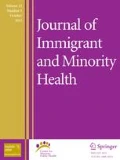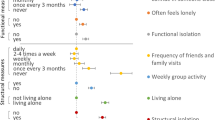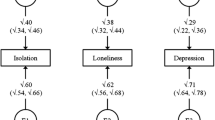Abstract
Despite an abundant literature on social support and health, relatively less is known about how support and its impact on physical health vary within the Black population. Using the National Survey of American Life (NSAL), this paper examines which sources and types of support are associated with physical health among African Americans, U.S.-born Caribbean Blacks and foreign-born Caribbean Blacks. The results showed that for U.S.-born Caribbean Blacks, being married was especially beneficial to health. Closeness to family was associated with better health while negative interactions with family members was associated with worse health for African Americans and foreign-born Caribbean Blacks. Different sources of instrumental support affected all three groups. Overall, the findings reveal that, among Black Americans, the association between social support and physical health is contingent upon ethnicity, nativity, and the ways in which social support and health are operationalized.
Similar content being viewed by others
References
Cohen S. Soc Relationsh Health. 2004;59(8):676–84.
Kawachi I, Berkman LF. Social ties and Mental health. J Urban Health. 2001;78:458–67.
Thoits PA. Stress, coping and social support processes: where are we? What next? J Health Soc Behav. 1995;35(extra issue):53–79.
Thoits PA. Mechanisms linking social ties and support to physical and mental health. J Health Soc Behav. 2011;52(2):145–61.
Turner RJ, Marino F. Social support and social structure: a descriptive epidemiology. J Health Soc Behav. 1994;35:193–212.
Turner RJ, Turner JB. Social integration and support. In: Aneshensel CS, Phelan JC, ed. Handbook of the sociology of mental health. New York: Kluwer Academic/Plenum Press; 1999. p. 301–319.
Uchino BN, Cacioppo JT, Kiecolt-Glaser JK. The relationship between social support and physiological processes: a review with emphasis on underlying mechanisms and implications for health. Psychol Bull. 1996;119(3):488–531.
Uchino BN. Social support and physical health: understanding the health consequences of relationships. New Haven: Yale University Press; 2004.
Debnam K, Holt CL, Clark EM, Roth DL, Southward P. Relationship between religious social support and general social support with health behaviors in a national sample of African Americans. J Behav Med. 2012;35:179–89.
Uchino BN. Social support and health: a review of physiological processes potentially underlying links to disease outcomes. J Behav Med. 2006;29(4):377–87.
Rastogi S, Johnson TD, Hoeffel EM, Drewery MP. The Black population: 2010. 2010 census briefs: United States Census Bureau; September 2011.
McCabe K. Caribbean immigrants in the United States. Migration information source. Migration Policy Institute. Obtained online at: http://www.migrationinformation.org/usfocus/display.cfm?ID=834; (2011).
U.S. Census Bureau Overview of Race and Hispanic Origin: 2010. Washington, DC: U.S. Census Bureau; 2011.
Thomas KJA. A demographic profile of Black Caribbean immigrants in the United States. Washington, DC: Migration Policy Institute; 2012.
Anderson A. A rising share of the U. S. Black population is foreign born; 9 percent are immigrants; and while most are from the Caribbean, Africans drive recent growth. Washington, DC: Pew Research Center; 2015.
Logan JR. Who are the other African Americans? Contemporary African and Caribbean immigrants in the United States. In: Shaw-Taylor Y, Tuch S, editors. The other African Americans: contemporary African and Caribbean immigrants in the United States. Lanham: Rowman and Littlefield Publishers; 2007. pp. 49–68.
Erving CL. Gender and physical health: a Study of African American and Caribbean Black Adults.” J Health Soc Behav. 2011;52(3):383–99.
Jackson JS, Antonucci TC. Physical and mental health consequences of aging in place and aging out of place among Black Caribbean immigrants.” Res Human Dev. 2005; 2(4):229–44.
Williams D, Haile R, González HM, Neighbors H, Baser R, Jackson JS. The mental health of Black Caribbean immigrants: results from the National Survey of American Life. Am J Public Health. 2007;97(1):52–9.
Lincoln KD, Taylor RJ, Chatters LM. Correlates of emotional support and negative interaction among African Americans and Caribbean Blacks. J Fam Issues. 2013;34(9):1262–90. doi:10.1177/0192513X12454655.
Taylor RJ, Forsthye-Brown I, Lincoln KD, Chatters LM. Extended family support networks of Caribbean Black adults in the United States. J Fam Issues. doi:10.1177/0192513X15573868.
Griffith DM, Johnson J, Zhang R, Neighbors H, Jackson JS. Ethnicity, nativity and health of American Blacks. J Health Care Poor Underserved. 2011;22(1):142–56.
House JS, Umberson D, Landis KR. Structures and processes of social support. Ann Rev Sociol. 1988;14:293–318.
Bertera EM. Mental health in U. S. adults: the role of positive social support and social negativity in personal relationships. J Pers Soc Relationsh. 2005;22:33–48.
DuPertuis LL, Aldwin CM, Bosse R. Does the source of support matter for different health outcomes? Findings from the Normative Aging Study. J Aging Health. 2001;13(4):494–510.
Jackson PB. Specifying the buffering hypothesis: support, strain, and depression. Soc Psychol Q. 1992;55(4):363–78.
Taylor RJ, Chatters L, Hardison CB, Riley A. Informal social support networks and subjective well-being among African Americans. J Black Psychol. 2001;27(4):439–63.
Ebaugh HR, Curry M. Fictive kin as social capital in new immigrant communities. Sociol Perspect. 2000;43(2):189–209.
Rook K. The negative side of social interaction: impact on psychological well-being. J Pers Soc Psychol. 1984;46(5):1097–108.
Lincoln KD. Social support, negative social interactions, and psychological well-being. Soc Serv Rev. 2000;74(2):231–52.
Lincoln KD, Chatters LM, Taylor RJ. Psychological distress among Black and White Americans: differential Effects of social support, negative interaction and personal control. J Health Soc Behav. 2003;44(3):390–407.
Anderson E. A place on the Corner. Chicago, IL: University of Chicago Press;1976.
Martin JM, Martin EP. The helping tradition in the Black family and community. Washington, DC: National Association of Social Workers, Inc; 1985.
Stack C. All Our kin: strategies for survival in a Black community. New York: Basic Books; 1974.
Rosier KB. Mothering inner-city children: the early school years. Piscataway, NJ: Rutgers University Press;2000.
Kiecolt KJ, Hughes M, Keith VM. Race, social relationships, and mental health. Pers Relationsh. 2008;15:229–45.
Raley RK. Black–White differences in kin contact and exchange among never married adults. J Fam Issues. 1995;16(1):77–103.
Peek MK, O’Neill GS. Networks in later life: an examination of race differences in social support networks. Int J Aging Hum Dev. 2001;52(3):207–29.
Taylor RJ, Chatters LM, Woodward AT, Brown E. Racial and ethnic differences in extended family, friendship, fictive kin, and congregational informal support networks. Fam Relat. 2013;62:609–24.
Chatters LM, Taylor RJ, Jayakody R. Fictive Kinship Relations in black extended families. J Comp Fam Stud. 1994;25(3):297–312.
Bashi V. Survival of the knitted: immigrant social networks in a stratified world. Stanford: Stanford University Press; 2007.
Waters MC. Black identities: west Indian immigrant dreams and American realities. New York: Harvard University Press; 1999.
Baptiste DA, Hardy KV, Lewis L. Family therapy with English Caribbean immigrant families in the United States: issues of emigration, immigration, culture and race. Contemp Fam Ther. 1997;19:337–59.
Taylor RJ, Forsythe-Brown I, Taylor HO, Chatters LM. Patterns of emotional social support and negative interactions among African American and Black Caribbean extended families. J Afr Am Stud. 2014;18(2):147–63.
Torres JM. Cross-border ties and self-rated health status for young Latino adults in Southern California. Soc Sci Med. 2013;81:79–86.
Mollenkopf J, Waters MC, Holdaway J, Kasinitz P. The ever-winding path: ethnic and racial diversity in the transition to adulthood. In: Settersten RA, Furstenberg, FF, Rumbaut RG, editors. On the frontier of adulthood: theory, research, and public policy. Chicago, IL: University of Chicago Press; 2005. pp. 454–500.
Portes A, Zhou M. The new second generation: segmented assimilation and its variants. Ann Am Acad Political Soc Sci. 1993;530:74–96.
Jones C, Erving CL. Structural constraints and lived realities: negotiating racial and ethnic identities for African–Caribbeans in the U.S.. J Black Stud. 2015;46(5):521–46.
McAdoo HP, Younge S, Getahun S. Marriage and family socialization among Black Americans and Caribbean and African immigrants. In: Shaw-Taylor Y, Tuch S, editors. The other African Americans: contemporary African and Caribbean immigrants in the United States. Lanham: Rowman and Littlefield Publishers; 2007. pp. 93–116.
Shim RS, Ye J, Baltrus P, Fry-Johnson Y, Daniels E, Rust G. Racial/ethnic disparities, social support, and depression: examining a social determinant of mental health. Ethn Dis. 2012;22(1):15–20.
Taylor RJ, Chae DH, Lincoln KD, Chatters LM. Extended family and friendship support networks are both protective and risk factors for major depressive disorder and depressive symptoms among African–Americans and Black Caribbeans. J Nerv Ment Dis. 2015;203:132–40.
Lincoln KD, Chatters LM, Taylor RJ. Social support, traumatic events, and depressive symptoms among African Americans. J Marriage Fam. 2005;67(3):754–66.
Lincoln KD, Chatters LM, Taylor RJ, Jackson JS. Profiles of depressive symptoms among African Americans and Caribbean Blacks. Soc Sci Med. 2007;65(2):200–13.
Levine DS, Taylor RJ, Nguyen AW, Chatters LM, Himle JA. Family and friendship informal support networks and social anxiety disorder among African Americans and Black Caribbeans. Soc Psychiatry Psychiatr Epidemiol. 2015;50:1121–33.
Ellison CG. Family ties, friendships, and subjective well-being among Black Americans. J Marriage Fam. 1990;52:298–310.
Lincoln KD, Chae DH. Emotional support, negative interaction and major depressive disorder among African Americans and Caribbean Blacks: findings from the National Survey of American Life. Soc Psychiatry Psychiatr Epidemiol. 2012;47(3):361–72. doi:10.1007/s00127-011-0347-y.
Dressler WW, Bindon JR. The health consequences of cultural consonance: cultural dimensions of lifestyle, social support, and arterial blood pressure in an African American community. Am Anthropol. 2000;102(2):244–60.
Strogatz DS, Croft JB, James SA, Keenan NL, Browning SR, Garrett JM, Curtis AB. Social support, stress, and blood pressure in Black adults. Epidemiology. 1997;8(5):482–7.
Strogatz DS, James SA. Social support and hypertension among Blacks and Whites in a rural, southern community. Am J Epidemiol. 1986;124:949–56.
Rodriguez CJ, Burg MM, MengJ, Pickering TG, Jin Z, Sacco RL, Boden-Albala B, Homma S, Di Tullio MR. Effect of social support on nocturnal blood pressure dipping. Psychosom Med. 2008;70:7–12.
Jackson JS, Torres M, Caldwell CH, Neighbors HW, Nesse RM, Taylor RJ, Trierweiler SJ, Williams DR. The National Survey of American Life: a study of racial, ethnic and cultural influences on mental disorders and mental health. Int J Methods Psychiatr Res. 2004;13(4):196–207.
Heeringa SG, Wagner J, Torres M, Duan N, Adams T, Berglund P. Sample designs and sampling methods for the Collaborative Psychiatric Epidemiology Studies (CPES). Int J Methods Psychiatr Res. 2004;13(4):221–40.
Idler EL, Benyamini Y. Self-rated health and mortality: a review of twenty-seven community studies. J Health Soc Behav. 1997;38(1):21–37.
Ross CE, Mirowsky J. Does employment Affect health? J Health Soc Behav. 1995;36(3):230–43.
Jackson PB, Cummings JL. Health disparities and the Black middle class: overview, empirical investigation, and discussion. In: Pescosolido B, Martin J, McLeod J, Rogers A, editors. The handbook of health, illness and healing: blueprint for the 21st century. New York, NY: Springer, 2011. pp. 383–410.
Aranda MP, Chae DH, Lincoln KD, Taylor RJ, Woodward AT, Chatters LM. Demographic correlates of DSM-IV major depressive disorder among older African Americans, Black Caribbeans, and Non-Hispanic Whites: results from the National Survey of American Life. Int J Geriatr Psychiatry. 2012;27(9):940–7.
St. Vil NM. A culture of mutual support. The impact of giving and receiving of practical and emotional support on African American marital satisfaction. J Fam Soc Work. 2015;18(2):78–89.
Taylor RJ, Brown E, Chatters LM, Lincoln KD. Extended family support and relationship satisfaction among married, cohabiting, and romantically involved African Americans and Black Caribbeans. J Afr Am Stud. 2012;16:373–89.
Singh GK, Siahpush M. Ethnic-immigrant differentials in health behaviors, morbidity, and cause-specific mortality in the United States: an analysis of two national data bases. Hum Biol. 2002;74:83–109.
Williams DR. Miles to go before we sleep: racial inequities in health. J Health Soc Behav. 2012;53(3):279–95.
Luo Y, Hawkley LC, Waite LJ, Cacioppo JT. Loneliness, health, and mortality in old age: a national longitudinal study. Soc Sci Med. 2012;74:907–14.
Hawkley LC, Cacioppo JT. Loneliness matters: a theoretical and empirical review of consequences and mechanisms. Ann Behav Med. 2010;40(2):1–14. doi:10.1007/s12160-010-9210-8.
Taylor RJ, Chae DH, Chatters LM, Lincoln KD, Brown E. DSM-IV 12-month and lifetime major depressive disorder and romantic relationships among African Americans. J Affect Disord. 2012;142:339–42.
Jordan-Marsh M, Harden JT. Fictive kin: friends as family support older adults as they age. J Gerontol Nursing. 2005;31(2):24–31.
Voorpostel M. The importance of discretionary and fictive kin relationships for older adults. In: Blieszner R, Bedford VH, editors. Handbook of families and aging. Santa Barbara, CA: ABC-CLIO, LLC; 2012. p. 243–62.
Kim HS, Sherman DK, Taylor SE. Culture and social support. Am Psychol. 2008;63(3):518–26.
Bagwell CL, Bender SE, Andreassi CL, Kinoshita TL, Montarello SA, Muller JG. Friendship quality and perceived relationship changes predict psychosocial adjustment in early adulthood. J Soc Pers Relationsh. 2005;22(2):235–54.
Chen Y, Feeley TH. Social support, social strain, loneliness, and well-being among older adults: an analysis of the health and retirement study. J Soc Pers Relationsh. 2014;31(2):141–61.
Mouzon D. Relationships of choice: can friendships or fictive kinships explain the race paradox in mental health? Soc Sci Res. 2014;44:32–43.
Chatters LM, Taylor RJ, Woodward AT, Nicklett EJ. Social support from church and family members and depressive symptoms among older African Americans. Am J Geriatr Psychiatry. 2015;23(6):559–67.
Lincoln KD, Taylor RJ, Bullard KM, Chatter LM, Himle JA, Woodward AT, Jackson JS. Emotional support, negative interaction and DSM IV lifetime disorders among older African Americans: findings from the National Survey of American Life (NSAL). Int J Geriatr Psychiatry. 2010;25(6):612–21.
Marshall-Fabien GL, Miller DB. Exploring ethnic variation in the relationship between stress, social networks, and depressive symptoms among older Black Americans. J Black Psychol. 2014;42(1):54–72.
Nguyen AW, Chatters LM, Taylor RJ, Mouzon DM. Social support from family and friends and subjective well-being of older African Americans. J Happiness Stud. 2016;17(3):959–79.
Hamilton TG. Do country-of-origin characteristics help explain variation in health among Black immigrants in the United States? Soc Sci Quart. 2014;95(3):817–34.
Alexander M. The new jim crow: mass incarceration in the age of colorblindness. New York: The New Press; 2011.
Beck AN, Finch BK, Lin S, Hummer RA, Masters RK. Racial disparities in self-rated health: trends, explanatory factors, and the changing role of socio-demographics. Soc Sci Med. 2014;104:163–77.
Cummings J, Jackson PB. Race, gender, and SES disparities in self-assessed health, 1974–2004. Res Aging. 2008;30(2):137–68.
Xu J, Murphy SL, Kochanek KD, Bastian BA. Deaths: final data for 2013. Natl Vital Stat Rep. 2016;64(2):1–119.
Acknowledgments
Funding was provided by Robert Wood Johnson Foundation (RWJF Health & Society Scholars Program).
Author information
Authors and Affiliations
Corresponding author
Ethics declarations
Confilct of Interest
There is no conflict of interest.
Rights and permissions
About this article
Cite this article
Erving, C.L. Ethnic and Nativity Differences in the Social Support-Physical Health Association Among Black Americans. J Immigrant Minority Health 20, 124–139 (2018). https://doi.org/10.1007/s10903-016-0492-1
Published:
Issue Date:
DOI: https://doi.org/10.1007/s10903-016-0492-1




